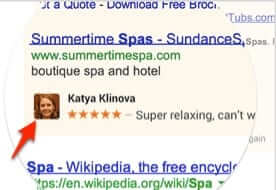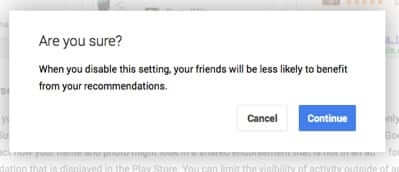
Google updated their Terms of Service today so that by default you allow them to use your reviews, posts, Plus Ones (“+1”), and other recommendations and ratings you provide through any Google service, along with your name and profile picture, as an “endorsement” in advertisements. Here’s how to remove yourself and opt out of Google’s “shared endorsements” advertising.
In the update to their TOS, Google explained that they are “clarifying how your Profile name and photo might appear in Google products (including in reviews, advertising and other commercial contexts).”
Put in plain English, if you ‘like’ something from within any Google app or service, you may find that your image and profile name are being used to shill it to your friends.
Sound familiar? It should. Astute readers will recall that last year Facebook was sued for featuring users in their advertisements.
The Internet Patrol is completely free, and reader-supported. Your tips via CashApp, Venmo, or Paypal are appreciated! Receipts will come from ISIPP.
That case, Fraley v. Facebook was settled when Facebook paid $20million into a fund to be distributed in part to the users whose images and names they had used, and agreed to change their Terms of Service.
No doubt this change in Google’s TOS is to help them keep within the guidelines to which Facebook had to adhere.
In Fraley v. Facebook, Facebook COO Sheryl Sandberg acknowledged that “making your customers your marketers” was the “goal we’ve been searching for.”
Now Google is searching for it too.
Let’s face it, for each of these companies you, as a user, are not their customer. Their customers are their advertisers – the companies who pay them their advertising dollars, for advertisements that they are going to feature you in as a way of enticing your friends to use their advertisers’ products or services.
More effective advertising means happier advertisers, which means more money to Facebook and Google. Their users are their commodities. When Facebook and Google do something to keep their users happy, it’s not unlike the farmer feeding the lambs – it’s not because they care about the lamb’s happiness, it’s about making the lamb grow fat and healthy so that the meat buyers will buy them. Keeping you around as a user is fattening up their user base to sell to the advertisers.
Here is what Google has to say about the new terms – and how to opt out of their using your information, profile name and picture in their advertising:
We want to give you – and your friends and connections – the most useful information. Recommendations from people you know can really help. So your friends, family and others may see your Profile name and photo, and content like the reviews you share or the ads you +1’d. This only happens when you take an action (things like +1’ing, commenting or following) – and the only people who see it are the people you’ve chosen to share that content with. On Google, you’re in control of what you share. This update to our Terms of Service doesn’t change in any way who you’ve shared things with in the past or your ability to control who you want to share things with in the future.
Feedback from people you know can save you time and improve results for you and your friends across all Google services, including Search, Maps, Play and in advertising. For example, your friends might see that you rated an album 4 stars on the band’s Google Play page. And the +1 you gave your favorite local bakery could be included in an ad that the bakery runs through Google. We call these recommendations shared endorsements and you can learn more about them here.
When it comes to shared endorsements in ads, you can control the use of your Profile name and photo via the Shared Endorsements setting. If you turn the setting to “off,” your Profile name and photo will not show up on that ad for your favorite bakery or any other ads. This setting only applies to use in ads, and doesn’t change whether your Profile name or photo may be used in other places such as Google Play.
If you previously told Google that you did not want your +1’s to appear in ads, then of course we’ll continue to respect that choice as a part of this updated setting. For users under 18, their actions won’t appear in shared endorsements in ads and certain other contexts.
For greater control over your experience with ads on Google, you can also use Google’s Ads Settings tool to manage ads you see. Learn more.
Here’s how to remove yourself – your profile name and image and reviews and +1s, etc. – from Google’s shared endorsements:
Go to the below link, and scroll to the very bottom of the page, where you will see this line, with a check box next to it:
“Based upon my activity, Google may show my name and profile photo in shared endorsements that appear in ads.”
Of course the check-box is prechecked to give Google permission to use your profile and activities:
Uncheck the check-box, and hit “Save”.
Google will try to get you to change your mind:
After you click on “Continue” (because you are sure), be sure to check to make sure that the box is unchecked.
Here is the link to remove yourself from the Google ‘shared endorsements’ advertising
The Internet Patrol is completely free, and reader-supported. Your tips via CashApp, Venmo, or Paypal are appreciated! Receipts will come from ISIPP.











Thanks! Big help!
Thanks for that How-To tutorial.
I’m more than happy to share and promote products and people I recommend, but I want to do it when and where and how I CHOOSE to, not at google’s whim.
Useful post, thanks for sharing with us. Cheers!
I’m confused. If I didn’t want it to be public, I wouldn’t have reviewed it, +1 it, or things like that…. what’s the problem? Oh right, the general public think there’s still privacy among the internet…. Also… this sites human verification method needs to disappear.